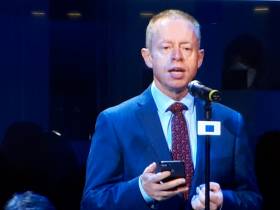Displaying items by tag: Our Ocean Conference
Marine Minister Attends ‘Our Ocean Conference’ In Bali
In the first of a series of engagements in Indonesia and Malaysia during the coming week, Marine Minister Michael Creed will address the Our Ocean Conference being held in Nusa Dua, Bali today and tomorrow (Monday 29 and Tuesday 30 October).
The Our Ocean series of conferences began in the USA in 2014 with the aim of bringing the international community together to generate global action for safe, secure and healthy oceans.
Minister Creed will join representatives of international governments, business, NGOs, foundations, research institutes and international organisations in presenting commitments that will contribute to the protection and sustainable use of the world’s oceans.
Discussions will focus on the areas of maritime security, marine pollution, sustainable fisheries, climate change, the blue economy and marine litter, with Minister Creed taking part in the panel discussion on climate change.
Irish commitments at the conference include the provision of €25 million to assist in the procurement of a new 50m modern research vessel that will provide critical national infrastructure to enable Ireland to address the considerable challenges of Brexit and the Common Fisheries Policy as well as climate induced impacts on our oceans.
The vessel will be used to undertake fisheries research, oceanographic and environmental research, and seabed mapping and surveys, and will also be tasked with maintaining and deploying weather buoys, observational infrastructure and ROVs.
Speaking in advance of the conference, Minister Creed said; “There are many challenges posed and threats in relation to our oceans and research is an intrinsic part of formulating a sustainable approach to the use, understanding and management of our oceans.
“In 2017, Ireland committed over €6 million in funding in the areas of seabed mapping and marine research and development and this year’s commitment further demonstrates our dedication to adequately resourcing our marine research community to carry out their role.”
Commitments To €6M Funding For Seabed Mapping & Marine Research Welcomed
#MarineScience - The Marine Institute has welcomed commitments of €6 million in funding for seabed mapping and marine research announced at the fourth Our Ocean Conference in Malta last week.
Ciaran Cannon, Minister of State for International Development, addressed representatives from more than 200 countries at the EU conference, stressing the importance of promoting and protecting the world's marine resources for present and future generations.
Aside from the new funding for mapping and research, Minister Cannon also announced the roll-out of a 'groundbreaking' Global Citizenship marine environment education module for school children from September 2017 onwards.
“This programme will increase ocean literacy by fostering understanding of the important role our oceans play in our lives, how individual actions can affect them and how we can act together to protect them,” he said.
Marine Institute chief executive Dr Peter Heffernan explained that the new module supports the aims of the institute’s own Explorers Education Programme “to build on Ireland's marine and maritime heritage by increasing awareness of the value, opportunities and social benefits of our ocean wealth and identity.”
Meanwhile, Minister Cannon committed to €320,000 in funding to the 2017 Clean Coasts programme and its more than 550 volunteer groups established in Ireland to date.
Also noted was an expansion of the 2015 Fishing for Litter programme, and continued contributions to support developing countries engagement at the UN on issues relating to marine governance.
In addition, Minister Cannon reaffirmed Ireland's commitment to prohibit the sale or manufacture of certain products containing microbeads, announced at the UN in June of this year.






























































